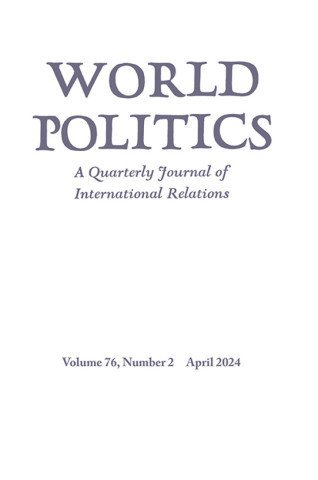Foreign Aid and Political Support: How Politicians' Aid Oversight Capacity and Voter Information Condition Credit-Giving
IF 2.5
1区 社会学
Q1 INTERNATIONAL RELATIONS
引用次数: 4
Abstract
abstract :Prominent scholarship on foreign aid argues that aid can interfere with citizens' ability to hold politicians accountable. One particular concern is that politicians receive undeserved credit for aid projects due to misattribution by voters with low information. But in some cases, politicians exert effort to ensure the success of projects and thus may deserve any credit they receive from voters. The authors show that the credit politicians receive depends both on voter information and on the capacity of politicians' offices to provide oversight. Drawing on original surveys of politicians and nongovernmental organizations (ngos) in Uganda, the authors describe circumstances in which politicians support the realization and administration of aid projects. The authors then use an experiment to show that information about foreign financing and ngo implementation of these projects reduces support for incumbent politicians only when their offices have low aid oversight capacity. The authors also provide evidence from other African countries that shows that credit-giving for aid depends on both information and state capacity. Their results suggest that voters think realistically about what politicians might have contributed to aid projects and update their assessments accordingly.对外援助与政治支持:政治家的援助监督能力与选民信息状况
摘要:著名的外国援助学者认为,援助会干扰公民追究政治家责任的能力。一个特别令人担忧的问题是,由于信息不足的选民的错误归因,政客们在援助项目上得到了不应有的赞扬。但在某些情况下,政客们会努力确保项目的成功,因此可能值得选民给予他们任何赞扬。作者表明,政客们获得的信贷既取决于选民信息,也取决于政客办公室提供监督的能力。根据对乌干达政界人士和非政府组织的原始调查,作者描述了政界人士支持实现和管理援助项目的情况。然后,作者通过一项实验表明,只有当现任政客的办公室援助监督能力较低时,有关外国融资和非政府组织实施这些项目的信息才会减少对他们的支持。作者还提供了其他非洲国家的证据,表明援助的信贷取决于信息和国家能力。他们的结果表明,选民们现实地思考政客们可能为援助项目做出了哪些贡献,并相应地更新他们的评估。
本文章由计算机程序翻译,如有差异,请以英文原文为准。
求助全文
约1分钟内获得全文
求助全文
来源期刊

World Politics
Multiple-
CiteScore
8.40
自引率
0.00%
发文量
24
期刊介绍:
World Politics, founded in 1948, is an internationally renowned quarterly journal of political science published in both print and online versions. Open to contributions by scholars, World Politics invites submission of research articles that make theoretical and empirical contributions to the literature, review articles, and research notes bearing on problems in international relations and comparative politics. The journal does not publish articles on current affairs, policy pieces, or narratives of a journalistic nature. Articles submitted for consideration are unsolicited, except for review articles, which are usually commissioned. Published for the Princeton Institute for International and Regional Affairs
 求助内容:
求助内容: 应助结果提醒方式:
应助结果提醒方式:


